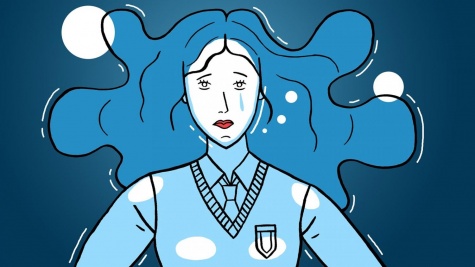
By Eden Milligan | Head Editor
September 9, 2020
COVID-19 has undeniably changed many lives in the US and around the world, but one group that is often overlooked in the midst of this major health crisis is teenagers. It may seem that teens have it easy—they do not have the fear, like the older demographic, of having a high risk of dying from the virus, and they were also less affected by the stock market crash and nation-wide unemployment spike in March. However, a virus with the power to enact so much change is not without its hardships, even for younger generations.
According to psychiatric research conducted at the Greater Paris University Hospitals, COVID-19, like any other crisis, has the power to invoke or worsen mental disorders such as Post-Traumatic Stress Disorder, Anxiety, and Depression in adolescents. For those who were already struggling with mental illness before the outbreak of the virus, COVID-19 posed challenges for obtaining support and treatment. Also, because people were restricted to their houses for so many months, adolescents with unstable family relationships had an increased source of stress and anxiety. Shockingly, there is a possibility that the symptoms some teens are experiencing now may continue even after life returns to “normal.” The Greater Paris study also stated that “Post-traumatic stress disorders in children have an impact on brain development,” meaning emotional issues, such as “increased threat reactivity and weaker emotion regulation,” may be lasting. Simply put, major events that change daily life can be extremely difficult to adjust to, and this can cause the onset of mental disorders, or intensify pre-existing disorders. In the unique case of the coronavirus, which pairs uncertainty with fear—as many can’t imagine what “normal” will look like, or fully understand the severity of the virus—it seems glaringly obvious why many adolescents are having difficulty coping.
An added challenge that burdens teenagers is the difficulties of navigating online school. For one, the sheer lack of excitement in the average online school day can be quite depressing. The monotonous cycle of virtual school coupled with the lack of friends and peers to confide in has been an issue for almost every student adjusting to online learning.
Another problem some students face is conflict with their at-home environment, involving both their physical surroundings and family members. Bethany Padilla, a San Clemente resident and junior at SCHS, described how COVID created conflict in her family because her “anarchist father” believes that “COVID is a hoax.” Bethany said this created a mental strain on her because she started to doubt whether she could trust her own parents to do the right thing and follow regulations (Bethany has an auto-immune disorder that puts her at high risk for the virus, and she also works at Zebra House Coffee and fears that she may transmit the virus to her coworkers and customers). Another issue that Bethany has been dealing with over the past few months is co-existing with a sibling in the same room. “Having to share a room with another human and being stuck in that room for too long…is just a recipe for conflicts and fights,” Bethany said about being stuck with her eleven-year old sister. Also, due to the uncertainty of the crisis, it can be hard to find a light at the end of the tunnel, or motivation to achieve in school.
“Doing schoolwork for hours on end without a change of environment has led me to be less motivated and has distorted my concept of reality,” eleventh-grader Kirra Schnell said. For some, it can be hard to even recall what life was like before quarantine; the whole world often seems limited to the four walls of a bedroom.
However much COVID-19 has degraded the old quality of life, it has certainly brought new perspectives and a greater sense of clarity as to what is truly important. After all, there are always silver linings to be found for those who are willing to look for them. For Kirra, one of those silver linings was growing closer with her family—particularly her little sister, Malea. “I can say that I feel as though I’ve grown a lot as a person and I’ve learned to not take the little things for granted,” Kirra said. Although COVID-19 has the potential for disastrous effects on teens’ mental health, with the right frame of mind, this unusual time may be the perfect opportunity for self-improvement.
If you are struggling with anxiety or depression because of COVID-19, know that you are not alone! 24 hour teen crisis line: (877) 968 8491

Thank you for bringing light to this issue with your article – I was sure to multiple journals on this topic during the summer (prior to engaging in online learning), but it is still a stress that I and lot of other teachers worry about regularly. For me, I’ve appreciated those students who felt comfortable reaching out and asking for support – the trust is great, and I also want to make sure that I’m supporting students, not harming them.